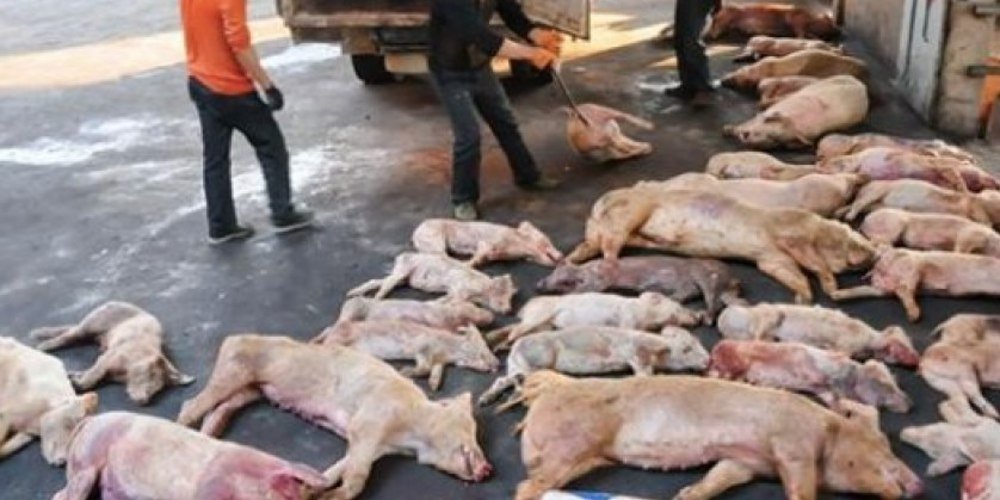- Pork producers in America have been administering mRNA-based gene therapy to pigs secretly, contaminating pork with self-assembling nanoparticles.
- Harrisvaccines pioneered RNA-based livestock vaccines, acquired by Merck Animal Health in 2016, leading to the prevalence of unregulated gene therapy in the livestock sector.
- Merck introduced Sequivity, a swine vaccine platform in collaboration with Moderna, without safety testing, raising concerns about consumer health risks.
- Companies plan to expand mRNA “vaccines” to avian influenza, cows, and cattle, prompting the need for transparent labeling and stringent regulations to protect public health.
- Consumers are advised to avoid pork products possibly tainted with mRNA vaccines, highlighting the urgent need for transparency and accountability in the food industry.
(Natural News)—There’s never been a more tell-tale sign that the medical industry in America wants to kill Americans than the injection of mRNA “technology” into farm animals we consume. These animals were never in danger of contracting or dying from Covid-19, so why inject them with “vaccines” that create millions of spike prions in the blood and body? The globalists, like Bill Gates, want everyone, not just the naïve vaccinated, to have bodies polluted with nanoparticles that create horrific health conditions for Big Pharma to “treat” with more poison.
It has come to light that pork producers in America have been quietly administering customizable mRNA-based gene therapy to animals, particularly pigs, for several years now. This practice, shrouded in secrecy, involves injecting mRNA clot shots into pigs without any disclosure on food labels. The implications of this clandestine operation are alarming, as consumers unknowingly ingest pork contaminated with millions of self-assembling nanoparticles that pose serious health risks, including heart problems, immune dysfunction, and dementia.
The pioneering company behind this controversial method, Harrisvaccines, introduced the first RNA-based livestock vaccine in 2012, followed by an avian influenza mRNA shot in 2015. Subsequently, Merck Animal Health acquired Harrisvaccines in 2016, signaling a significant development in the mRNA-based gene therapy industry. CureVac also joined the fray by developing an mRNA-based rabies shot for pigs, further solidifying the prevalence of this unregulated practice in the livestock sector.
Shocking Revelation: mRNA Clot Shots Injected into Pigs Across America Unbeknownst to Consumers
The introduction of Sequivity, a swine vaccine platform in 2018 by Merck in collaboration with Moderna, marked a significant milestone in the integration of mRNA technology in livestock production. Shockingly, these mRNA “vaccines” undergo no safety testing, raising serious concerns about the long-term effects on consumers who have been unknowingly consuming gene therapy-treated pork for almost five years.
Moreover, the expansion of this controversial practice looms large as companies set their sights on implementing mRNA-lipid nanoparticle vaccines for avian influenza and cows. Lobbyists for the Cattlemen’s Association have confirmed plans to introduce mRNA “vaccines” in cattle, potentially impacting both dairy and beef products. The lack of transparency surrounding the use of Sequivity in pork production raises red flags about the integrity of the food supply chain and consumer safety.
The urgency of addressing this issue cannot be overstated, especially with the impending Trump administration. Missouri House Bill 1169 emerges as a beacon of hope in protecting consumers from gene-therapied pork and other meats by mandating transparent labeling of products that can alter genetic composition. The resistance from industry players against this bill raises questions about their motives and underscores the need for stringent regulations to safeguard public health.
Coffee the Christian way: Promised Grounds
As the debate rages on, consumers are advised to exercise caution and avoid pork products, including organic options, that may have been tainted with mRNA vaccines. The ramifications of consuming gene-altering foods extend beyond individual health concerns to broader ethical and regulatory implications that demand immediate attention and action.
In a landscape fraught with hidden dangers and corporate interests, the call for transparency and accountability in the food industry has never been more critical. The veil of secrecy shrouding mRNA injecting of livestock must be lifted, and stringent measures must be implemented to protect consumers from the insidious effects of unregulated gene therapy in our food supply. #mRNAPollutedPigs
Tune your food news frequency to FoodSupply.news and get updates on animal meat and byproducts that are highly contaminated with self-assembling nanoparticles that are reducing the world’s population quickly.


